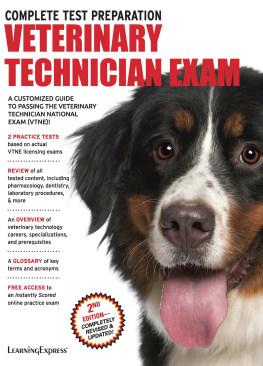Learning Express Llc - Veterinary Technician Exam
Here you can read online Learning Express Llc - Veterinary Technician Exam full text of the book (entire story) in english for free. Download pdf and epub, get meaning, cover and reviews about this ebook. year: 2015, publisher: LearningExpress, LLC, genre: Children. Description of the work, (preface) as well as reviews are available. Best literature library LitArk.com created for fans of good reading and offers a wide selection of genres:
Romance novel
Science fiction
Adventure
Detective
Science
History
Home and family
Prose
Art
Politics
Computer
Non-fiction
Religion
Business
Children
Humor
Choose a favorite category and find really read worthwhile books. Enjoy immersion in the world of imagination, feel the emotions of the characters or learn something new for yourself, make an fascinating discovery.
- Book:Veterinary Technician Exam
- Author:
- Publisher:LearningExpress, LLC
- Genre:
- Year:2015
- Rating:3 / 5
- Favourites:Add to favourites
- Your mark:
- 60
- 1
- 2
- 3
- 4
- 5
Veterinary Technician Exam: summary, description and annotation
We offer to read an annotation, description, summary or preface (depends on what the author of the book "Veterinary Technician Exam" wrote himself). If you haven't found the necessary information about the book — write in the comments, we will try to find it.
Learning Express Llc: author's other books
Who wrote Veterinary Technician Exam? Find out the surname, the name of the author of the book and a list of all author's works by series.
Veterinary Technician Exam — read online for free the complete book (whole text) full work
Below is the text of the book, divided by pages. System saving the place of the last page read, allows you to conveniently read the book "Veterinary Technician Exam" online for free, without having to search again every time where you left off. Put a bookmark, and you can go to the page where you finished reading at any time.
Font size:
Interval:
Bookmark:
CHAPTER 1
VETERINARY TECHNOLOGY AS A PROFESSI ON
CHAPTER OVERVIEW
Veterinary technicians can perform many roles in many fields, from assisting the veterinarian in a private practice to working with pharmaceutical and pet food companies, zoos, and wildlife centers, to teaching. In the past, many veterinary technicians, learned the job simply by doing it, now called veterinary assistants but now it is required in nearly every state and province to get proper training and certification. That is the reason you are reading this book. The VTNE is the national certification exam, and some states require additional testing. Veterinary specializations and other degrees are available as well. There are a number of veterinary technology associations that keep members informed about things veterinary such as educational opportunities. Technicians must always maintain a professional and safe appearance. Finally, this chapter discusses veterinary technician salaries and benefits.
V eterinary technology is a very exciting career with endless opportunities for advancement and lifelong learning. The functions of a technician in the veterinary hospital include animal care and nursing, radiography, laboratory tasks, surgical assisting, dentistry, anesthesia, pharmacologic calculations and administration, clinic maintenance, business managing, grief counseling, and public health duties. The technician is the clinic employee who spends the most time with patients and clientsit is often the technicians job to translate doctor-speak to plain language that the client can understand. Often, the technician is the liaison with pharmaceutical sales representatives as well as being responsible for managing inventory and maintaining equipment in the practice. In short, veterinary technicians can do everything but diagnose, make a prognosis of the expected outcome of a disease, prescribe drugs, and perform surgery. They are an integral part of the veterinary healthcare team.
Education and Certification
A veterinary technician is a graduate of an AVMA (American Veterinary Medical Association) or CVMA (Canadian Veterinary Medical Association) accredited program in veterinary technology who successfully passed the VTNE. In most cases, the graduate is granted an associates degree or certifi cate. Typically, a student can complete a program in 2 years. However, there are exceptions, and each school's admissions office can clarify the time it takes for completion. The AVMA Committee for Veterinary Technician Education and Activities (CVTEA) is the accrediting body of the AVMA and performs inspections of facilities and programs at least every six years at every accredited institution in the United States and Canada. Annual or biennial self-study reports are also submitted by each institution to address any deficiencies noted by the site team. Accreditation by this body indicates that quality education, facilities, and institutional support are present and that students receive the education expected by the AVMA.
Passing the VTNE and graduating allows the students to call themselves CVTs (Certified Veterinary Technicians). Some states require their own exam in addition to the VTNE to become a veteri nary technician. Check your states Department of Professional Regulations for their specific requirements. Depending on a particular states veterinary practice act, a CVT may also be called an RVT (Registered Veterinary Technician) or an LVT (Licensed Veterinary Technician). For maintenance of licensure, CVTs in some states may be required to take continuing education credits every two years. The number of credits varies by state. These credits may be obtained at local, state, or national veterinary meetings or veterinary technician schools or associations.
Opportunities for further education and advancement are widely available. A number of schools offer a bachelor of science (BS) degree in veterinary technology. The bachelors degrees are usually more specialized than two-year p rograms and may focus on office management, laboratory animal medicine, or animal care. Most degreed programs articulate into the BS programs. That degree generally requires additional courses in communications/English, the social sciences, and the humanities.
Specialization certifications are also available for technicians in practice or with special interests through the National Association of Veterinary Technicians in America (NAVTA). Veterinary Technician Specialist (VTS) is the certification offered; it usually requires intensive training, including case studies and certification testing in the specialty field. VTSs are offered in eleven fields: anesthesia, emergency medicine and critical care, equine medicine, zoo medicine, dentistry, veterinary behavior, internal medicine, surgery, clinical pathology, clinical practice, and nutrition. The list is always growing. These specializations generally lead to higher salaries.
Specialization in laboratory animal medicine is offered through the American Association for Laboratory Animal Science (AALAS) based on continuing education in laboratory animal medicine, certification testing, and experience (number of years in lab animal practice).
Functions of a Veterinary Technician
Veterinary technicians with or without a specialization are extremely valuable in many fields. CVTs/LVTs/RVTs are employed at veterinary hospitals, specialty practices, government, pharmaceutical and medical equipment companies, pet food companies, sales departments, research facilities, teaching programs, zoos, wildlife management centers, animal behavior centers, and many other institutions. The opportunities are endless.
Government jobs for CVTs include research, food and site inspection, animal cruelty investigations, shelter medicine, service-dog training, evaluation of zoo facilities, and public health. Government jobs tend to come with higher salaries and include excellent benefits such as health, dental, vacation, paid continuing education, and regular hours.
Pharmaceutical companies usually employ CVTs in sales or research. Again, the benefits are high wage-earning potential with good benefits. Experience with laboratory animal medicine is important in research jobs. Pharmaceutical sales teams often use CVTs because they are well trained in client education and have good communication skills as well as expertise in pharmacology. High wages are possible, but are often based on sales commissions, and travel may be required.
Most of the larger pet food companies operate research facilities that are staffed by CVTs who are in charge of animal care and research. These companies also use CVTs for education and to answer the food hotlines, which give information about the foods (whether prescription or maintenance).
Zoos, wildlife centers, and animal behavior centers are usually looking for CVTs with experience in the field or with specialty certification. Many also request a few years of clinical experience, which gives the CVT more real-world application of skills.
Teaching positions may also be available to CVTs. To teach at the community college level, most schools require a minimum of a CVT and at least two years of experience in the field. University or state colleges usually require a CVT with a BS or a BA (bachelor of arts) plus two years of experience. Clinical teaching positions are also available at veterinary schools. Technicians employed at vet schools are of ten involved in teaching the veterinary students clinical skills and laboratory medicine. Because clinical teaching technicians are usually employed as staff, the educational requirements are not as stringent.
Veterinary Technician Associations
Veterinary technician associations are excellent means of networking with other technicians and opening up job opportunities. NAVTA has branches in most statesfor example, the Florida Veterinary Technician Association (FVTA)and most veterinary technology programs have student affiliations with the national association.
Next pageFont size:
Interval:
Bookmark:
Similar books «Veterinary Technician Exam»
Look at similar books to Veterinary Technician Exam. We have selected literature similar in name and meaning in the hope of providing readers with more options to find new, interesting, not yet read works.
Discussion, reviews of the book Veterinary Technician Exam and just readers' own opinions. Leave your comments, write what you think about the work, its meaning or the main characters. Specify what exactly you liked and what you didn't like, and why you think so.

